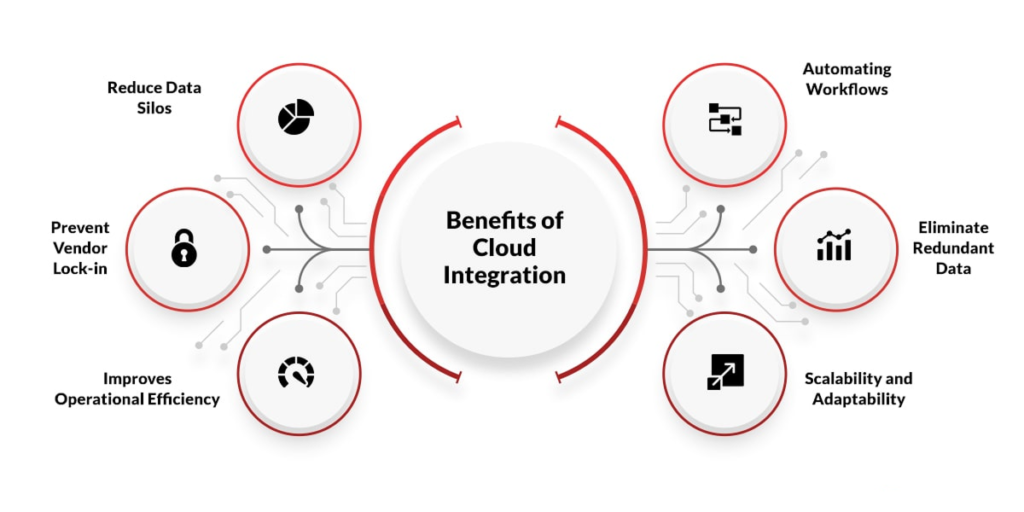In today’s fast-paced digital landscape, cloud integration has emerged as a critical tool for small businesses aiming to stay competitive and efficient. Whether it’s cloud migration, leveraging cloud services, or implementing cloud solutions, SMBs are increasingly turning to cloud technology to streamline operations, reduce costs, and enhance scalability. At Master Infotech, we specialize in helping small businesses harness the power of the cloud to drive growth and efficiency. In this comprehensive guide, we’ll explore the benefits of cloud integration for SMBs, effective cloud integration strategies, and how Master Infotech can be your trusted partner in this transformative journey.
What is Cloud Integration?

Cloud integration refers to the process of connecting various cloud-based applications, platforms, and services to create a unified and efficient IT ecosystem. For small businesses, this means integrating tools like Customer Relationship Management (CRM) software, accounting platforms, project management tools, and cloud storage solutions into a single, seamless system. The primary goal of cloud integration is to break down data silos, streamline workflows, and ensure real-time data synchronization across all platforms. Whether you’re considering cloud migration or exploring cloud services, the process empowers businesses to improve productivity, reduce operational costs, and enhance data accessibility.
In simpler terms, cloud integration allows businesses to connect their existing software and tools to cloud-based platforms, enabling them to work together harmoniously. For example, integrating your CRM with your email marketing tool ensures that customer data is automatically updated across both platforms, eliminating the need for manual data entry and reducing errors. Similarly, connecting your accounting software with your inventory management system can provide real-time insights into your financial health and stock levels.
Why is Cloud Integration Essential for Modern Businesses?
In today’s digital-first world, businesses rely on a multitude of applications and tools to manage their operations. However, without proper integration, these tools often operate in isolation, leading to inefficiencies, data inconsistencies, and missed opportunities. Cloud integration solves this problem by creating a connected ecosystem where data flows seamlessly between applications. This is particularly important for small businesses, which often lack the resources to manage complex IT infrastructures.
For instance, imagine a small e-commerce business using separate tools for inventory management, order processing, and customer support. Without cloud integration, employees would need to manually transfer data between these systems, leading to delays and potential errors. By adopting cloud solutions, the business can automate these processes, ensuring that inventory levels are updated in real-time, orders are processed efficiently, and customer queries are resolved promptly.
Key Components of Cloud Integration
- Connecting Business Applications: Integrating different software applications ensures they work together seamlessly. For example, integrating your CRM with your email marketing tool automates customer communication.
- Data Synchronization: Ensuring data from various sources is consolidated and updated in real-time. This is crucial for businesses that rely on accurate insights for decision-making.
- Unifying Cloud Platforms: Combining multiple cloud platforms to create a cohesive IT environment. For example, integrating Microsoft Azure with Google Cloud to leverage the strengths of both platforms.
- Automating Business Processes: Automating workflows across multiple applications. For instance, integrating your e-commerce platform with your accounting software streamlines the order-to-cash process.
How Cloud Integration Works
The process of cloud integration typically involves the following steps:
- Assessment: Identify the applications and tools your business uses and determine how they can be connected. This step also involves understanding your business goals and how cloud adoption can help achieve them.
- Planning: Develop a detailed integration plan, including the tools and technologies required, the timeline, and the resources needed.
- Implementation: Use integration platforms or middleware to connect your applications. This may involve APIs (Application Programming Interfaces) or pre-built connectors.
- Testing: Ensure that the integrated system works as expected and that data flows seamlessly between applications.
- Optimization: Continuously monitor and refine the system to meet evolving business needs.
Examples of Cloud Integration in Action
- E-commerce: An online store integrates its e-commerce platform with its inventory management system and payment gateway. This ensures that inventory levels are updated in real-time, and payments are processed seamlessly.
- Healthcare: A clinic integrates its Electronic Health Records (EHR) system with its appointment scheduling tool. This allows doctors to access patient records during appointments and update them in real-time.
- Retail: A small retailer integrates its Point of Sale (POS) system with its accounting software. This ensures that sales data is automatically recorded in the accounting system, reducing the need for manual data entry.
- Education: A school integrates its Learning Management System (LMS) with its student information system. This allows teachers to access student data and grades directly from the LMS.
Benefits of Cloud Integration for SMBs

- Cost Efficiency: One of the most significant advantages of cloud solutions is their cost-effectiveness. SMBs can avoid the high upfront costs of hardware and software by opting for pay-as-you-go cloud services.
- Scalability: As your business grows, your IT needs will evolve. Cloud integration allows you to scale your resources up or down effortlessly, ensuring you only pay for what you use.
- Improved Collaboration: With cloud services, teams can access data and tools from anywhere, fostering better collaboration and remote work capabilities.
- Enhanced Security: Reputable cloud solutions offer robust security features, including encryption, multi-factor authentication, and regular backups, protecting your business from data breaches.
- Automation: Cloud integration automates repetitive tasks, such as data entry and report generation, freeing up time for strategic activities.
- Disaster Recovery: Cloud platforms provide reliable backup and recovery solutions, ensuring business continuity in case of data loss or system failures.
Cloud Integration Strategies for SMBs
Implementing cloud integration requires careful planning and execution. Here are some proven strategies to help SMBs succeed:
- Assess Your Needs: Start by identifying the specific challenges your business faces. Determine which cloud services can address these challenges and align with your business goals.
- Choose the Right Cloud Services: Not all cloud solutions are created equal. Select platforms that cater to your industry and business size, such as Microsoft Azure, AWS, or Google Cloud.
- Plan Your Cloud Migration: A successful cloud migration requires a detailed plan. Outline the steps involved, allocate resources, and set a realistic timeline to ensure a smooth transition.
- Train Your Team: Ensure your employees are well-trained to use cloud tools effectively. Provide training sessions and resources to help them adapt to the new system.
- Monitor and Optimize: After implementing cloud integration, continuously monitor its performance. Use analytics to identify areas for improvement and optimize your cloud infrastructure.
- Partner with Experts: Working with a trusted IT partner like Master Infotech can simplify the process. Our team of experts specializes in cloud integration, cloud migration, and cloud solutions, ensuring a seamless experience for your business.
Why Choose Master Infotech for Cloud Integration?

At Master Infotech, we understand the unique challenges small businesses face. Our team of experts specializes in cloud integration, cloud migration, and cloud solutions tailored to your needs. From assessing your requirements to implementing the right cloud services, we ensure a seamless and hassle-free experience. With Master Infotech, you can focus on growing your business while we handle the technical complexities.
Real-World Applications of Cloud Integration
- E-commerce: Online stores can use cloud solutions to manage inventory, process payments, and analyze customer data in real-time.
- Healthcare: Clinics and small practices can leverage cloud services to store patient records securely and streamline administrative tasks.
- Education: Schools and training centers can use cloud platforms to deliver online courses and manage student data efficiently.
- Retail: Small retailers can integrate cloud tools to track sales, manage supply chains, and enhance customer experiences.
Common Challenges in Cloud Integration and How to Overcome Them
- Data Security Concerns: While cloud solutions offer robust security, SMBs must ensure compliance with industry regulations. Partnering with experts like Master Infotech can help address these concerns.
- Integration Complexity: Integrating multiple cloud services can be challenging. A well-planned strategy and the right tools can simplify the process.
- Cost Management: While cloud integration is cost-effective, it’s essential to monitor usage to avoid unexpected expenses. Regularly review your cloud usage and optimize resources.
Future Trends in Cloud Integration
- AI and Machine Learning: Cloud platforms are increasingly incorporating AI and machine learning to provide predictive analytics and automation.
- Edge Computing: This trend involves processing data closer to the source, reducing latency and improving performance.
- Hybrid Cloud Solutions: Combining public and private cloud services offers greater flexibility and security for SMBs.
Conclusion
Cloud integration is a game-changer for small businesses, offering enhanced efficiency, cost savings, and security. By leveraging cloud services, companies can automate processes, improve collaboration, and scale operations without extensive IT investments. Implementing the right cloud solutions and adopting a structured cloud migration strategy ensures businesses remain competitive in the digital age. Partnering with industry leaders like Master Infotech guarantees expert guidance and seamless integration, allowing small businesses to thrive with the power of cloud technology.
Ready to unlock the full potential of cloud integration for your small business? Contact Master Infotech today for expert cloud solutions that drive efficiency, scalability, and growth!
Follow us:
Facebook: @masterinfotechofficial
LinkedIn: @master-infoetchofficial
Instagram: @masterinfotechofficial





